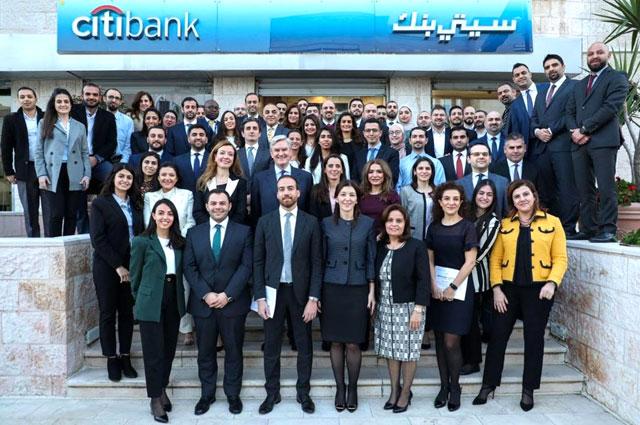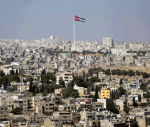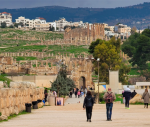You are here
Citibank development programmes target entrepreneurs, underprivileged in Jordan
By Maram Kayed - Feb 28,2020 - Last updated at Feb 28,2020

In Jordan, Citibank works with the government, local corporates and international companies and agencies that have a presence in the Kingdom, according to David Livingstone, Citi’s CEO for the Europe, Middle East and Africa region (Photo courtesy of Citibank)
AMMAN — Citibank, the sole US bank in Jordan for over four decades, is currently focusing on the Kingdom as part of its efforts to help emerging markets, a focus that goes hand-in-hand with funding community engagement programmes that target Syrian refugees and vulnerable Jordanians.
“The reason we are keeping a close eye on developing markets is that lately, developed markets have been experiencing low interest rates, which has implications for the returns available for fixed-income classes or equities and so on, therefore, investors may well be looking into developing markets instead,” said David Livingstone, Citi’s CEO for the Europe, Middle East and Africa region.
In an interview with The Jordan Times, Livingstone noted that “developing markets” could be developing due to a number of factors, including core economic growth, structural development, potential reforms and capital needs, among others.
“We, as Citi, are present in 55 countries in the Europe, Middle East and Africa region, with 29 of those described as ‘emerging markets’. In the last four years or so, Citi has grown around 7 per cent per annum, and we continue to see potential.”
In Jordan, Citibank works with the government, local corporates and international companies and agencies that have a presence in the Kingdom, making it “part of a global network, not just an island on its own”, according to Livingstone.
When it comes to small- and medium-sized enterprises and other local enterprises, the CEO noted that, while they currently operate locally and exclusively in the Jordanian Dinar, “as soon as these enterprises need to take their operations to a global level, Citi has the capabilities to help them to do that”.
Rising “local champions”, which are entities that operate in any given sector and have the potential to go multi-national, are of “specific interest” to Citibank. Once the entity realises its own potential, according to Livingstone, the bank offers them the needed banking services, foreign exchange services and strategic advice.
Working with the government, Citi has expressed its gratitude for Jordan’s “trust and confidence in the bank to deal with their international bonds and capital raising in global markets”, said Livingstone.
As part of its corporate social responsibility, the Citi Foundation’s Pathways to Progress initiative is a global programme which mainly works to enable young people to become active economic participants, either through funding entrepreneurship projects or handing out the bank’s expertise through workshops and training.
In the Kingdom, the bank funds a programme called Rescuing Futures, which supports refugees and vulnerable local youth to “rebuild their livelihoods”, and “kick-start their small businesses in Jordan, Nigeria and Greece through a mix of grant-making and business training”.
In 2019, the programme saw an extension of coverage to include Lebanon, Cameroon and Germany, with the total number of beneficiaries reaching nearly 4,000. A cumulative grant of $5.5 million was extended by the foundation, of which Jordan’s branch of the programme received $1 million.
Several beneficiaries of the programme shared their work at an informal event held at the International Rescue Committee’s Mojtamai’ Community Centre in Amman.
Rehab, one of the 71 entrepreneurs funded so far by the Rescuing Futures project, said: “When a customer comes to you, it changes your mood. It helps you forget the past a bit."
Rehab is a talented tailor who fled Syria and has now set up her own small sewing business in Amman. Through Rescuing Futures, she learned how to manage a business and was then selected for a small grant, which she used to buy her own sewing machine, scissors, a table and some materials.
“The programme has helped me expand my business. It’s a huge difference in financial terms,” she added.
In Amman, the programme has so far funded projects in sectors including handicrafts, beauty services, catering, beekeeping and advertisement since 2017. It has also trained another 220 people on entrepreneurial skills.
By 2021, a further 186 will receive support through training, mentorship, apprenticeships or grants for new or existing businesses. Opened in 2018 and run jointly with the Greater Amman Municipality, the Mojtamai’ Community Centre also helps support the bank’s vision.
“Young people — Syrian and Jordanian — living in Amman today are tomorrow’s business leaders and employees,” said Laura Kyrke-Smith, executive director of the IRC in the UK.
“The IRC is proud to partner with Citi and the Greater Amman Municipality to help these talented young people kick-start their careers,” she added.
Related Articles
AMMAN — Citi has hosted a two-day webinar forum under the theme “Navigating the Future: What’s next in a post-COVID19 world?” the comp
AMMAN — A new partnership launched on Wednesday between the Citi Foundation and the International Rescue Committee (IRC) will provide refuge
During the Jordan Business Magazine Awards ceremony, Citibank Jordan has been announced as the winner of the “CSR Programme of the Year” Awa













